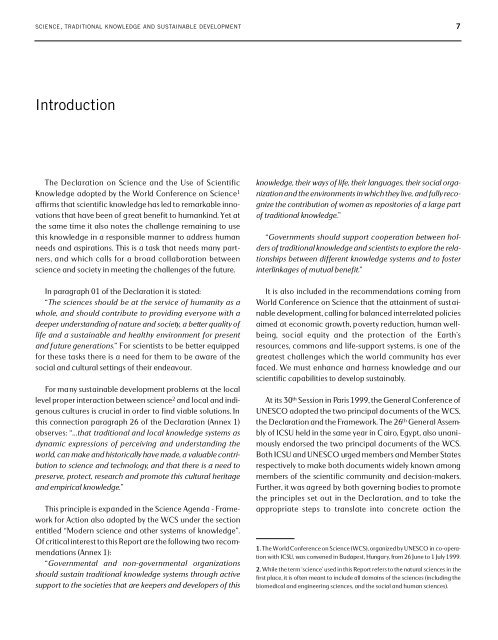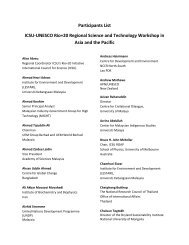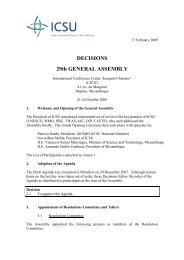Science, Traditional Knowledge and Sustainable Development
Science, Traditional Knowledge and Sustainable Development
Science, Traditional Knowledge and Sustainable Development
You also want an ePaper? Increase the reach of your titles
YUMPU automatically turns print PDFs into web optimized ePapers that Google loves.
S C I E N C E, T R A D I T I O N A L K N O W L E D G E A N D S U S TA I N A B L E D E V E L O P M E N T 7<br />
Introduction<br />
The Declaration on Sc i e n ce <strong>and</strong> the Use of Sc i e n ti fi c<br />
Kn owledge adopted by the World Co n fe re n ce on Sc i e n ce 1<br />
affirms that scientific knowledge has led to remarkable innovations<br />
that have been of great benefit to humankind. Yet at<br />
the same time it also notes the challenge re m aining to us e<br />
this knowledge in a res po n s i ble manner to address hum an<br />
needs <strong>and</strong> as p i rations. This is a task th at needs many par tn<br />
e rs, <strong>and</strong> which calls for a broad col l a bo ration be twe e n<br />
science <strong>and</strong> society in meeting the challenges of the future.<br />
In paragraph 01 of the Declaration it is stated:<br />
“The sciences should be at the servi ce of hum an i ty as a<br />
w h ole, <strong>and</strong> should co n tr i b ute to providing ev e ryone with a<br />
deeper underst<strong>and</strong>ing of nature <strong>and</strong> society, a better quality of<br />
l i fe <strong>and</strong> a sus tai n a ble <strong>and</strong> hea l thy envi ronment for pres e n t<br />
<strong>and</strong> future generations.” For scientists to be better equipped<br />
for th ese tasks th e re is a need for them to be aware of th e<br />
social <strong>and</strong> cultural settings of their endeavour.<br />
For many sustainable development problems at the local<br />
level proper interaction between science 2 <strong>and</strong> local <strong>and</strong> indigenous<br />
cultures is crucial in order to find viable solutions. In<br />
this co n n e c tion para gra ph 26 of the Declaration (Annex 1)<br />
ob s e rves: “ …th at tra d i tional <strong>and</strong> local know l edge sy s tems as<br />
dyn amic expressions of pe rce iving <strong>and</strong> un d e rs t<strong>and</strong>ing th e<br />
w o r l d, can make <strong>and</strong> histo r i cally have made, a valuable co n tr ib<br />
ution to science <strong>and</strong> tec h n ol ogy, <strong>and</strong> th at th e re is a need to<br />
p res e rve, pro tec t, res earch <strong>and</strong> pro m o te this cu l tural herita g e<br />
<strong>and</strong> empirical know l ed g e .”<br />
This principle is exp<strong>and</strong>ed in the <strong>Science</strong> Agenda - Framework<br />
for Action also adopted by the WCS under the section<br />
e n ti tled “Modern science <strong>and</strong> other sys tems of knowl e d g e ” .<br />
Of critical interest to this Report are the following two recommendations<br />
(Annex 1):<br />
“G ov e r n m e n tal <strong>and</strong> non-gov e r n m e n tal org an i zati o n s<br />
should sus tain tra d i tional know l edge sy s tems th rough activ e<br />
s u p port to the soc i e ti es th at are kee pe rs <strong>and</strong> dev el o pe rs of th i s<br />
k n ow l edge, their ways of life, their lan g u a g es, their social org an<br />
i zation <strong>and</strong> the envi ronments in which th ey live, <strong>and</strong> fully recogn<br />
i ze the co n tr i b ution of women as re po s i to r i es of a large par t<br />
of tra d i tional know l ed g e .”<br />
“G overnments should support coo pe ration be tw een hold<br />
e rs of tra d i tional know l edge <strong>and</strong> scientists to expl o re the rel ati<br />
o n ships be tw een diffe rent know l edge sy s tems <strong>and</strong> to fo s te r<br />
i n te r l i n ka g es of mutual be n efi t .”<br />
It is also included in the re co m m e n d ations coming fro m<br />
World Conference on <strong>Science</strong> that the attainment of sustainable<br />
development, calling for balanced interrelated policies<br />
aimed at economic growth, poverty reduction, human wellbe<br />
i n g, social equi ty <strong>and</strong> the pro te c tion of the Ear th ’s<br />
res o urces, commons <strong>and</strong> life - s u p port sys te m s, is one of th e<br />
gre atest challenges which the world co m m un i ty has eve r<br />
fa ced. We must enhan ce <strong>and</strong> har n ess knowledge <strong>and</strong> our<br />
scientific capabilities to develop sustainably.<br />
At its 30 th Session in Paris 1999, the General Conference of<br />
UNESCO adopted the two principal documents of the WCS,<br />
the Declaration <strong>and</strong> the Framework. The 26 th General Assembly<br />
of ICSU held in the same year in Cairo, Egypt, also unanim<br />
o usly endorsed the two principal documents of the WC S .<br />
Both ICSU <strong>and</strong> UNESCO urged members <strong>and</strong> Member States<br />
respectively to make both documents widely known among<br />
m e m be rs of the scienti fic co m m un i ty <strong>and</strong> decision-make rs .<br />
Further, it was agreed by both governing bodies to promote<br />
the principl es set out in the Declaration, <strong>and</strong> to ta ke th e<br />
a p p ro p r i ate steps to tran sl ate into co n c re te action th e<br />
1. The World Conference on <strong>Science</strong> (WCS), organized by UNESCO in co-operation<br />
with ICSU, was convened in Budapest, Hungary, from 26 June to 1 July 1999.<br />
2. While the term ‘science’ used in this Report refers to the natural sciences in the<br />
first place, it is often meant to include all domains of the sciences (including the<br />
biomedical <strong>and</strong> engineering sciences, <strong>and</strong> the social <strong>and</strong> human sciences).




